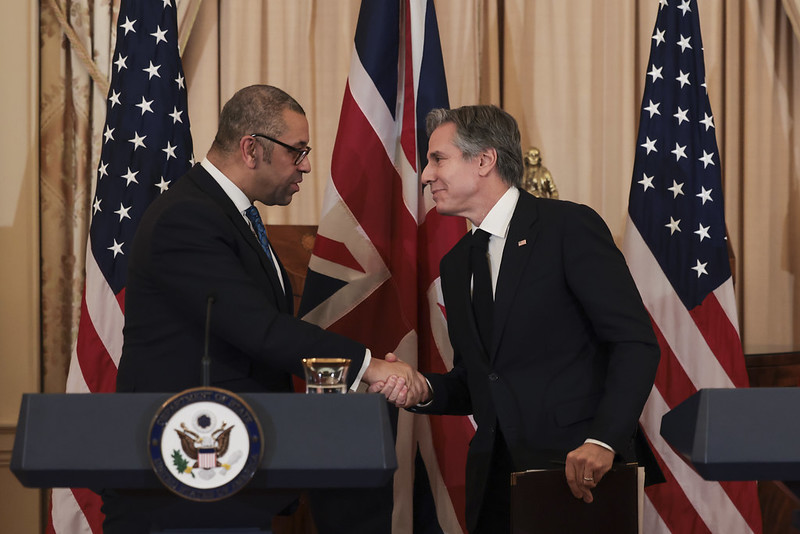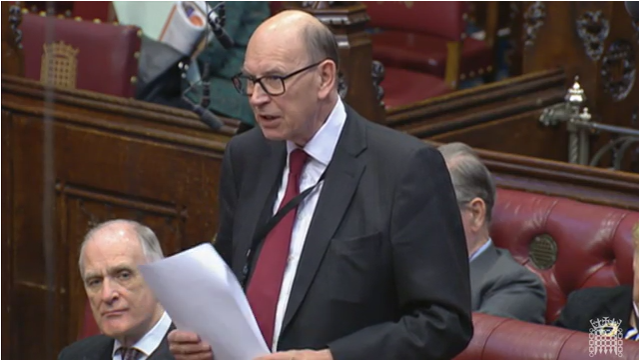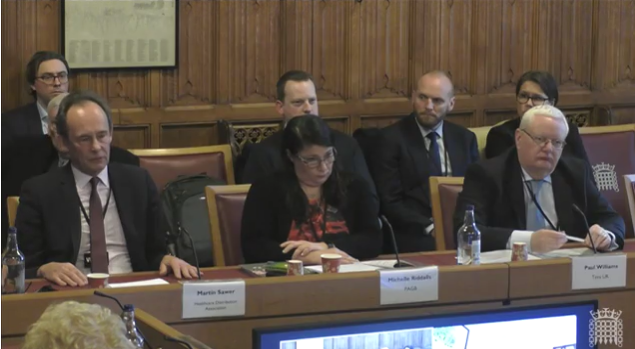Brexit & Beyond Newsletter
23 January 2023
 Welcome to the 23 January 2023 Brexit & Beyond newsletter
Welcome to the 23 January 2023 Brexit & Beyond newsletter
Today’s newsletter covers the latest on the Protocol, including further engagement between Irish and UK ministers, input from the US, and speculation from UK media about a deal with the EU, and the role of the ECJ. The House of Lords debated the ‘democratic deficit’ in the Protocol, and avenues for better scrutiny of EU legislation applying to Northern Ireland. The medicines sector has raised concerns about ongoing issues for the supply of medicines to Northern Ireland under the Protocol. The Retained EU Law Bill has passed the final stages in the Commons.
A compromise in sight?
Following last week’s anticipation of an EU-UK joint statement setting out agreed principles on the Protocol, Tony Connelly reports that the two sides “couldn't get agreement on a number of issues which would have complicated solutions on bigger topics” but that “landing zones are close and the ball is in the UK court if [Prime Minister] Sunak wants a deal.” The Telegraph reports that the Prime Minister is considering a compromise which will see the European Court of Justice (ECJ) maintain a role in oversight of the Protocol, but with an additional independent panel for dispute resolution. Deputy Chairman of the European Research Group David Jones and DUP MP Sammy Wilson say they will not accept a “fudge”. DUP leader Sir Jeffrey Donaldson addressed the ERG last week and the two groups are in “lockstep”. NI Office Minister Steve Baker told reporters during his visit to Dublin last week, “I very much hope we will bring the DUP and Eurosceptic MPs to the same positive base in our relations with Ireland.”
Jeffrey Donaldson spoke to ITV earlier last week. He said the role of EU law is “inhibiting” Northern Ireland’s ability to trade with the rest of the UK, and the role of the ECJ was one of the issues which needed to be addressed. He said if there is an agreement or UK legislation which meets the party’s seven tests, “we will call on unionists to support it”. He said the UK Government’s was “wrong” to progress work on permanent border control posts in Northern Ireland - if that was to implement current Protocol arrangements, he is “vehemently opposed” to it. The Belfast Telegraph reports that work has already taken place at the site for border control posts in Larne.
The deadline for the Executive to form was Thursday 19 January; the Secretary of State is obliged to hold an election in the next 12 weeks. In the Irish Times, Chris Heaton-Harris writes, “I will use the next few weeks I have available to me to assess carefully all options about what happens next and to continue to talk to all interested parties before I make any decisions.”
UK-Ireland relations
Taoiseach Leo Varadkar and Labour leader Keir Starmer discussed the Protocol talks at the World Economic Forum in Davos. Speaking to the BBC, the Taoiseach said, “The regret that I have, is that in the same way Brexit was imposed on Northern Ireland without the support of both communities, the Protocol was imposed on Northern Ireland without the support of two communities.” Varadkar has also said the 25th anniversary of the Good Friday Agreement is not an “absolute deadline” for getting an agreement on the Protocol. He said the Irish Government was seeking to be “as flexible and as reasonable as we can”, in keeping with the principles of having no hard border on the island of Ireland and upholding integrity of the EU single market. Speaking in Brussels, Tánaiste Micheál Martin has said the EU-UK negotiations are “challenging” and they should be allowed “space”. He said, “quiet, in terms of negotiations, is no bad thing.”
The British-Irish Intergovernmental Conference took place on 19 January. UK and Irish Ministers discussed a range of topics, including political stability, energy and security cooperation, and UK proposals for the implementation of an electronic travel authorisation scheme. (This would not apply to British or Irish citizens.)
US views on the Protocol
UK Foreign Secretary James Cleverly was in Washington on 17 January to meet with Antony Blinken, US Secretary of State. Their conversation “touched on” Northern Ireland. Blinken said, “The United States believes that there must be a negotiated settlement to the implementation of the Northern Ireland Protocol that’s acceptable to all sides. And we’re heartened that in recent days the United Kingdom and the European Union have made substantive progress towards the negotiated solution.” Cleverly said, “we recognise the interest that the President of the United States has…on this issue, and his desire, which is shared of course by us, to see the institutions of the Northern Ireland back up and running.” Cleverly went on to say they are not trying to “hit a particular date or anniversary” in the negotiations. He stated that he has tried to keep the negotiations with the EU “discreet”, saying he thinks that “has actually helped us get some things over the line” and he intends to keep the details of talks discreet.

UK Foreign Secretary James Cleverly and US Secretary of State Antony Blinken | Source: Simon Dawson / No 10 Downing Street
Secretary Blinken noted the appointment of Joe Kennedy III as Special Envoy to Northern Ireland for Economic Affairs. Kennedy has shared his goals, which include increasing trade between NI and the US. The Secretary of State for Northern Ireland Chris Heaton-Harris is in the US to “drum up investment opportunities”. He will meet with Joe Kennedy III.
Lords debate the ‘democratic deficit’
On Friday 20 January, the House of Lords debated a report from the Sub-Committee on the Protocol on Ireland/Northern Ireland on ‘Scrutiny of EU legislative proposals within the scope of the Protocol’. Chair of the committee Lord Jay told peers, “There is a real democratic deficit here” - currently over 300 pieces of EU legislation apply to Northern Ireland and are “subject to neither the UK Government’s participation in the EU institutions nor to consent from parliamentarians at either Westminster or Stormont.” Lord Jay stressed the Government’s obligation to set out to Parliament the full implications of EU legislation applying to NI under the Protocol (in ‘Explanatory Memoranda -EM), including the views expressed by the NI Executive. The quality of these EMs, according to the report, has been “variable and, in some cases, frankly poor.”

Lord Jay of Ewelme, Chair of the Lords Sub-Committee on the Protocol on Ireland/Northern Ireland | Source: UK Parliament
Lord Hannay suggested the Government could reverse its decision to block the European Commission’s establishment of an office in Belfast and that a dedication section of the UK Mission to the EU in Brussels could be formed and tasked with ensuring EU institutions understand the implications of EU legislation for NI. Lord Dodds (DUP) endorsed the calls for better scrutiny of EU regulations, saying, “Even when the Assembly in Northern Ireland met, unfortunately, regrettably—quite amazingly, in my view—it did not do this type of [scrutiny] work.” Lord Hain suggested there could be similar arrangements to those of Norway - democratic institutions in Northern Ireland could scrutinise and amend draft EU laws. He added there should be direct consultation between MLAs and MEPs, remarking, “These are practical and common-sense solutions to a real problem that, quite understandably, exercises unionists.”
Lord Ahmad responded on behalf of the Government. He said the Foreign Office is working with other government departments to analyse the EU law that applies in Northern Ireland, including with regard to divergence issues. The Government’s view is that the democratic deficit will have to be addressed “if the protocol is to operate sustainably” and this is one of the matters they seek to address in discussions with the EU.
Protocol still impacting medicines’ supply
The Lords Sub-Committee on the Protocol took evidence from the pharmaceutical sector on 18 January. Under the Protocol, Northern Ireland applies EU pharmaceutical regulations, while the Medicines and Healthcare products Regulatory Agency (MHRA) regulates for the rest of the UK. This prompted major concerns about the supply of medicines to NI, causing the European Union to change its legislation. Martin Sawer of the Healthcare Distribution Association, whose members distribute over 92% of NHS medicines, said distribution to Northern Ireland is “challenging, problematic, inefficient, and a sort of slow strangulation by a thousand cuts”. He said additional paperwork is costing the sector about £2.5 million a year and there is still uncertainty about SPS measures for medical foodstuffs, saying currently, “we’re just doing sticking plaster stuff”. Michelle Riddalls, Chief Executive of PAGB, the trade association for branded over-the-counter medicines, said they are “encouraged” by the EU’s change to its legislation and this was “paramount” for continuity of supply and has worked well for over the counter medicines.

Martin Sawer of the Healthcare Distribution Association, Michelle Riddalls of PAGB, and Paul Williams of Teva UK | Source: UK Parliament
Paul Williams, Senior Director at pharmaceutical company Teva UK, highlighted six outstanding issues to the committee. He explained the Centralised Authorisation Procedure (CAP or CP), the most pressing issue witnesses highlighted to the committee. Under CP, medicines are authorised at EU rather than national level. Now companies have to ‘migrate’ CP licences to GB licences. But for NI, the CP licence still applies and so GB licenced products cannot be dispensed or sold in NI. At the end of this year, the same product would have to have two separate licences – a GB one, and a CP one for NI. Ultimately, NI is a small market and it is not viable to have two licences and two packs for the same medicine. Williams called the situation a ‘cliff edge’.
The EU Falsified Medicines Directive, which continues to operate in NI, was also raised: Sawer questioned whether it is working properly in NI. Riddalls explained issues around medical devices. The Northern Ireland MHRA Authorised Route (NIMAR), which the Government introduced to ensure prescription medicines could be supplied to NI if this wasn’t possible through existing regulatory routes, was called “bureaucratic” and one witness said it leaves ambiguities.
Williams said, “It feels like we steered away from one cliff edge and there’s still more to come”: the industry still does not have stability and certainty. On the proposed dual regulatory regime in the UK Government’s Northern Ireland Protocol Bill, witnesses agreed that they would have concerns about how it would work in practice. Williams emphasised that dual regulation only works if there is no regulatory divergence. On Wednesday, the Committee will hold another evidence session on the subject.
Retained EU Law Bill passes the Commons
The final House of Commons stages of the Retained EU Law Bill took place on Wednesday 18 January. The Bill facilitates the repeal, replacement, or amendment of Retained EU Law by the end of 2023. The Bill passed its third reading by 297 votes to 238. Senior Fellow at the Institute for Government Jill Rutter writes in the Financial Times that the EU regulation-making process is unlikely to have delivered the optimal legislation for the UK. But she says the Bill is “much more likely to blow up in [the] Government’s face than deliver noticeable benefits.” She argues that shortcuts are “inevitable” and mistakes will occur, pointing out the challenges of intra-UK divergence, and “mountains of detailed work by civil servants” which would be required.
Alliance MLA Kate Nicholl says the Bill threatens gender equality in the workplace, pointing to legislation on holiday pay, and maternity leave. She said the Bill “is an attack on working women, and this Government doesn’t have any mandate to strip away paid holidays, health and safety protections or to roll back rights supporting working mothers.” The Wildlife Trusts have denounced the Bill, saying it has “serious implications for environmental protections”.
The Bill has moved to the House of Lords for scrutiny where it had its first reading on 19 January 2023.
Other news
- Shadow Secretary of State for Northern Ireland Peter Kyle was in Derry last week meeting businesses and discussing the Protocol arrangements and issues. Mr Kyle said he hoped the DUP would study a future deal on the Protocol “in a really openhearted way, and in a way which really engages with all the challenges in Northern Ireland.” On last week’s joint statement from the EU and UK, Kyle said he was “slightly disappointed that there wasn’t more positive news coming out of immediate negotiations.”
- Sinn Féin President Mary Lou McDonald, Vice-President Michelle O’Neill and finance spokesman Conor Murphy were in London last week for engagements on the Protocol on Ireland/Northern Ireland. Michelle O’Neill appeared on BBC Newsnight and said “the Protocol is working”, adding that the majority of people in NI “accept the Protocol as a necessary mitigation” of Brexit.
- The EU Ambassador to the UK met the NI Secretary of State Chris Heaton-Harris to discuss EU-UK relations and the Protocol.
- The Environmental Justice Network Ireland (EJNI) has published research examining how the environment sector on the island of Ireland can cooperate on shared challenges. It finds that “Brexit raises valid concerns over increased declines in environmental standards, policy/governance uncertainty and regulatory divergence.”
- The Commons European Scrutiny Committee’s latest report covers the EU’s autonomous vehicles regulations, which apply in Northern Ireland under the Protocol. The committee notes that the automotive sector had expressed a preference for UK and EU rules for selling automated vehicles in GB and the EU not to diverge. The Government “does not expect there to be any practical impact on producers in NI” as there is an absence of relevant manufacturers in NI, and a small market size for such vehicles. The report also considers EU proposals to strengthen rules governing legal trade in firearms for civilian use, which would apply in NI and would mean that relevant authorities operating in NI and GB would be subject to different licensing requirements and import procedures.
- The Commons Library has published an article on the EU’s Entry/Exit system (EES) and European Travel Information and Authorisation System (ETIAS), which are to be operational by the end of 2023. The EES would register non-EU travellers (including from the UK) each time they cross an external EU border. The ETIAS is a system to authorise entry to the EU for non-EU citizens who do not need a visa. The arrangements also apply to countries in the Schengen area. Ireland will not conduct EES or ETIAS checks as it has a Common Travel Area with the UK and is not part of Schengen. The UK’s Electronic Travel Authorisation scheme is to be in place by the end of 2024.
- The UK in a Changing Europe think tank has published an article on the impact of the post-Brexit immigration system on the UK labour market.
- RTÉ reports on a new book by Stefaan De Rynck, former aide to Michel Barnier (the EU’s chief negotiator during the Brexit process).



